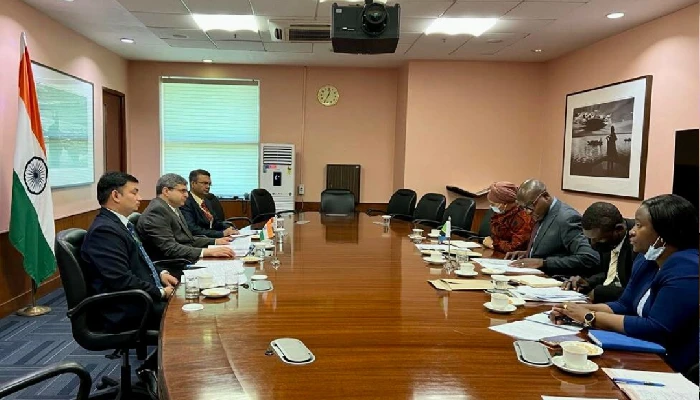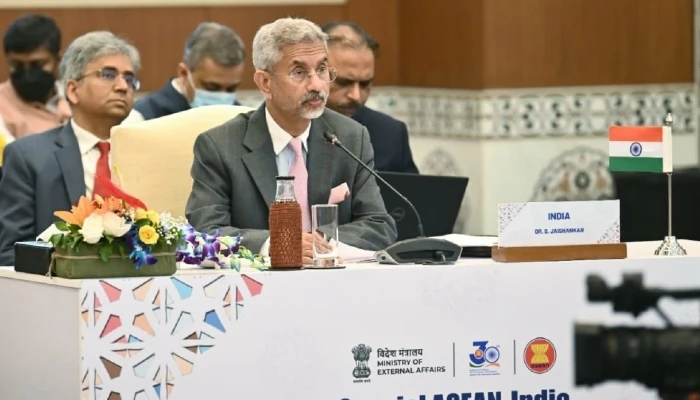There have been no restrictions on public stockholding of food or fishing, he said
India has been able to secure a favourable outcome at the WTO after many years, Union Minister of Commerce and Industry Piyush Goyal said on Friday.
This was despite a strong global campaign against India's farmers & fishermen, Goyal said after conclusion of the WTO 12th Ministerial Conference in Geneva.
Terming the just concluded MC12 as an “outcome oriented” success, he said the Indian delegation leveraged India’s strong relationship with the world, which Prime Minister Narendra Modi has nurtured over the last few years.
"Few countries attempted to create false campaign, initially on Sunday and Monday, that India is obstinate due to which no progress is being made. The real situation has emerged before us all, the issues raised by India, on which Prime Minister had asked us to focus upon, now the whole world acknowledges that was the correct agenda and ultimately India played a vital role in arriving at all solutions,” Goyal told a press conference in Geneva, according to a press release issued by the Ministry of Commerce and Industry.
Goyal said India took the lead and was at the center of the conference. “India’s efforts to bring members on a table to discuss issues irrespective of the existing geopolitical order has ensured that the world order is not broken,” he said.
The minister maintained that there was no issue on which India had to be the concerned, whether it was related to Agriculture such as MSP, reinforcing the relevance of the Public Stockholding Programme towards fulfilling the National Food Safety Programme or PM Garib Kalyan Scheme, TRIPS Waiver, e-Commerce moratorium, response to covid and fisheries.
“Similarly there have been no restrictions on fishing that our fishermen were deeply concerned about, that would bind artisanal and traditional fishermen of India in the future. India has been cent percent successful; no restrictions or terms have been placed on India or the Government, rather we have been successful in introducing checks on illegal fishing, under-reporting or outside regulation, viz IUU fishing," he added.
Goyal said India remains committed to supporting the World Food Programme (WFP). Citing India’s recent wheat supplies to Afghanistan, he said the Government has imposed no export restrictions on WFP purchases for food security in other countries; however, domestic food security takes priority.
On the global fight against the Covid19, Goyal said the Trade-Related Aspects of Intellectual Property Rights (TRIPS) decision will boost vaccine equity, accessibility & affordability. It will enable ease of authorisation for production of patented vaccines and India can produce for domestic requirements and exports.
On the WTO Reforms agenda, Goyal said the basic structure and core principles of WTO including Consensus, S&DT provisions, SDG goals, will be retained while making it more contemporary. “I believe it will be good for the WTO, and will be good for the Developing and Under-Developed countries in the future and foster global trade through transparent means,” he said.
Outcomes at the WTO MC 12 Meeting
* On fisheries, there would be a check on illegal unreported and unregulated fishing in our waters and elsewhere. There would be very strict controls on overfished areas so that fish stocks are restored. Additionally, no subsidies to be provided for fishing in areas outside EEZ or RFMOs
* The TRIPS decision will boost export, vaccine equity, accessibility & affordability. A country can authorize production of vaccines patented elsewhere and there would be no consent required as well as there would be no limit on exports. A decision on Diagnostics/Therapeutics would be taken in 6 months. There would be faster pandemic response in future and there would be fewer trade barriers in pandemics
* The agenda decided on WTO reforms will make the WTO a more efficient, agile body. The dispute settlement body will be revived and play its expected role in settling trade disputes. The reform would deliver better trade outcomes for developing countries. A reference to Gender, Environment & MSME has been made in the WTO reform agenda
* On e-Commerce, while agreeing to the temporary moratorium, India asked for intensifying discussions on the moratorium including on its scope, definition and impact for taking an informed decision on the same.
* The Food Security Declaration, focusses on making food available in developing countries while working towards increasing productivity and production
* As regards, the World Food Programme (WFP), there would be no export restrictions on WFP purchases for food security in other countries; However, domestic food security will take priority.
 Contact Us
Contact Us  Subscribe Us
Subscribe Us









 Contact Us
Contact Us
 Subscribe
Subscribe
 News Letter
News Letter

